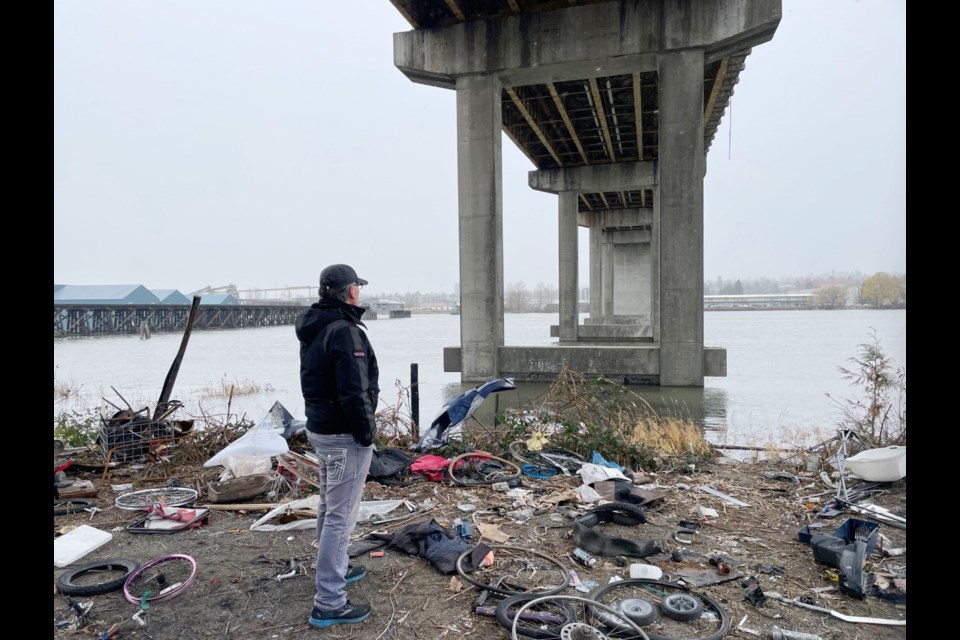It’s 10 a.m. and the mercury has yet to rise above -2 Celsius in Richmond.
As we drive around the back streets of the city’s north end, one wonders what the temperature was like before sunrise for the people we see cowered into corners of vacant buildings and in the crevices under the Oak and Knight street bridges.
What was it like a few hours ago for the man under a pile of blankets of various material, sheltered only from the Arctic blast by an old golf umbrella?
Or the man sleeping behind a makeshift, eight-foot high wall of filled, black garbage bags?
And then there’s the 30-strong caravan of RVs on Vulcan Way, most in a state of disrepair, some mobile, although some clearly haven’t shifted an inch for a very long time.
Most of them boast all manner of home-made contraptions, designed to convince the chilling breeze whipping off the nearby Fraser River to divert away from their “home.”
Our driver, Hugh Freiberg, knows most of the locals, many of them pensioners, bringing them a hot meal, amongst other vital items, six nights a week.
Freiberg — an after-hours outreach worker — said he’s never seen it so bad in the 10 years he’s been seeking out those who need help on the streets of Richmond, noting that the RV train wasn’t there prior to the pandemic.
“I’ve witnessed a dramatic increase in homelessness and opiate overdoses,” and delivered “twice as many meals since pre-Covid,” said Freiberg, who works with the Salvation Army, with the support of the Richmond Food Aid Delivery Coalition.
“The situation is really bad right now and is getting worse by the month. It’s about to blow up in our faces.”
Report: Too much reliance on faith community
Freiberg’s stark assessment jives with a report – compiled by the local Union Gospel Mission – presented to Richmond city council this week by members of the aforementioned food aid delivery coalition.
At that presentation Monday evening, which Freiberg attended, council members were told of the gravity of the situation on the front line of homelessness in Richmond.
The 20-page report was titled “One to Ten Minutes to Connect,” pointing to the notion that outreach workers, such as Freiberg, have that time window to connect with a person living on the street, assess their needs and gain a modicum of trust that might just save their lives.
Billed as an “inventory of outreach services” in the city, the report paid homage to the many voluntary arms of Richmond’s faith community, which scrimps and scrapes to provide the life support of more than 16,000 meals a year for Freiberg to deliver in the dead of night.
But it also highlights the fact that there’s way too much reliance on Richmond’s patchwork of faith-based volunteers to be the vital cog in the wheel of support for people living on the street.
“What happens when the (professional) support closes at 4:30 p.m.?” asked Freiberg, noting that most of the services in place operate on regular office hours.
“Who’s supposed to take care of all these people? We got a lot of Band-Aid solutions here.
“Yes, there is a temporary shelter and there are the 80 mods (temporary modular homes), but there are still so many people out there who either can’t get into a shelter to get help or don’t want to leave their tent or little camp because they are scared.
“Whatever agency I’m directing these people to, that (agency) has gone home for the night or for the weekend.
“I’m dealing with all this stuff after hours and it gets ugly. I’ve seen it. I’m in the middle of it.
“It’s all happening after hours. The support is not there.”
“The Downtown East Side is coming to Richmond, if it’s not here already. They just say Richmond’s streets are a safer place to live than Vancouver.”
Homelessness not a Monday to Friday issue
As well as taking a hot meal to those not able or willing to venture into civilization, Freiberg tries to direct them to the Salvation Army Emergency Shelter and/or other services such as MSDPR (welfare), Turning Point, Chimo, St. Albans Advocacy and more.
“You have me, as an after-hours outreach worker, connected to the Salvation Army, pumping out all these meals and supplies (underwear, gloves, coats, etc.) while I can,” said Freiberg.
If you want to help, go to https://salvationarmyrichmond.org/
“I’m making these connections. The problem is still the same and it has never changed in all the years I’ve been doing this — the support operates (in office hours).”



